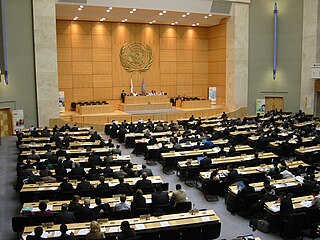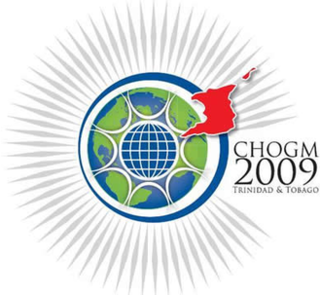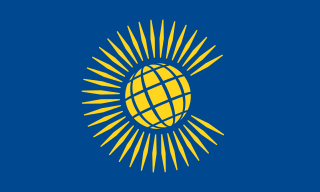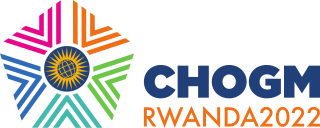The Commonwealth Heads of Government Meeting is a biennial summit meeting of the governmental leaders from all Commonwealth nations. Despite the name, the head of state may be present in the meeting instead of the head of government, especially among semi-presidential states. Every two years the meeting is held in a different member state and is chaired by that nation's respective prime minister or president, who becomes the Commonwealth Chair-in-Office until the next meeting. Queen Elizabeth II, who was the Head of the Commonwealth, attended every CHOGM beginning with Ottawa in 1973 until Perth in 2011, although her formal participation only began in 1997. She was represented by the Prince of Wales at the 2013 meeting as the 87-year-old monarch was curtailing long-distance travel. The Queen attended the 2015 summit in Malta and the 2018 summit in London, but was represented again by the Prince of Wales at the 2022 meeting in Rwanda.

The Organisation of Islamic Cooperation, formerly the Organisation of the Islamic Conference, is an intergovernmental organization founded in 1969, consisting of 57 member states, with 48 being Muslim-majority countries. The organisation states that it is "the collective voice of the Muslim world" and works to "safeguard and protect the interests of the Muslim world in the spirit of promoting international peace and harmony".

The World Summit on the Information Society (WSIS) was a two-phase United Nations-sponsored summit on information, communication and, in broad terms, the information society that took place in 2003 in Geneva and in 2005 in Tunis. WSIS Forums have taken place periodically since then. One of the Summit's chief aims is to bridge the global digital divide separating rich countries from poor countries by increasing internet accessibility in the developing world. The conferences established 17 May as World Information Society Day.

The Group of Seven (G7) is an intergovernmental political and economic forum consisting of Canada, France, Germany, Italy, Japan, the United Kingdom and the United States; additionally, the European Union (EU) is a "non-enumerated member". It is organized around shared values of pluralism, liberal democracy, and representative government. G7 members are the major IMF advanced economies.

The 2005 World Summit was a United Nations summit held between 14 and 16 September 2005 at the U.N. headquarters in New York City. It was a follow-up summit meeting to the U.N.'s 2000 Millennium Summit.

The ASEAN Summit is a biannual meeting held by the members of the Association of Southeast Asian Nations (ASEAN) in relation to economic, political, security, and socio-cultural development of Southeast Asian countries. In addition, it serves as a prominent regional (Asia) and international (worldwide) conference, with world leaders attending its related summits and meetings to discuss various problems and global issues, strengthening co-operation, and making decisions. The summit has been praised by world leaders for its success and ability to produce results on a global level.

The Conference on Interaction and Confidence-Building Measures in Asia (CICA) is an inter-governmental forum for enhancing cooperation towards promoting peace, security and stability in Asia. It is a forum based on the recognition that there is a close link between peace, security and stability in Asia and in the rest of the world. The key idea of the Conference is based on the priority of the indivisibility of security, joint initiative and mutually beneficial interaction of small and large states.

The Millennium Summit was a meeting among many world leaders, lasting three days from 6 to 8 September 2000, held at the United Nations headquarters in New York City. Its purpose was to discuss the role of the United Nations at the turn of the 21st century. At the meeting, world leaders ratified the United Nations Millennium Declaration. This meeting was the largest gathering of world leaders in history as of 2000. It was followed five years later by the World Summit, which took place from 14 to 16 September 2005.

The IBSA Dialogue Forum is an international tripartite grouping for promoting international cooperation among these countries. It represents three important poles for galvanizing South–South cooperation and greater understanding between three important continents of the developing world namely, Africa, Asia, and South America. The forum provides the three countries with a platform to engage in discussions for cooperation in the field of agriculture, trade, culture, and defence among others.

The Elders is an international non-governmental organisation of public figures noted as senior statesmen, peace activists and human rights advocates, who were brought together by Nelson Mandela in 2007. They describe themselves as "independent global leaders working together for peace, justice, human rights and a sustainable planet". The goal Mandela set for The Elders was to use their "almost 1,000 years of collective experience" to work on solutions for seemingly insurmountable problems such as climate change, HIV/AIDS, and poverty, as well as to "use their political independence to help resolve some of the world's most intractable conflicts".
The 1997 Commonwealth Heads of Government Meeting was the 15th Meeting of the Heads of Government of the Commonwealth of Nations. It was held in Edinburgh, Scotland, between 24 October and 27 October 1997, and hosted by Prime Minister Tony Blair.

The 2009 Commonwealth Heads of Government Meeting was the 21st Meeting of the Heads of Government of the Commonwealth of Nations. It was held in Port of Spain, Trinidad and Tobago, between 27 and 29 November 2009, and was hosted by that country's Prime Minister, Patrick Manning.

The China–Japan–South Korea trilateral summit is an annual summit meeting attended by the People's Republic of China, Japan and South Korea, three major countries in East Asia and the world's second, fourth and 12th largest economies. The first summit was held during December 2008 in Fukuoka, Japan. The talks are focused on maintaining strong trilateral relations, the regional economy and disaster relief.

The Commonwealth of Nations, often simply referred to as the Commonwealth, is an international association of 56 member states, the vast majority of which are former territories of the British Empire from which it developed. The chief institutions of the organisation are the Commonwealth Secretariat, which focuses on intergovernmental aspects, and the Commonwealth Foundation, which focuses on non-governmental relations among member states. Numerous organisations are associated with and operate within the Commonwealth.

The 2013 Commonwealth Heads of Government Meeting was the 23rd Meeting of the Heads of Government of the Commonwealth of Nations. It was held in Colombo, Sri Lanka, from 15 to 17 November 2013. Commonwealth leaders agreed on Sri Lanka as the 2013 host for the meeting when they met in Port of Spain, Trinidad and Tobago, in 2009. Sri Lanka, which was originally slated to host the summit in 2011, was accused of committing atrocities during the Sri Lankan civil war and the summit was instead held in Perth, Australia; Colombo was given the 2013 summit instead. The leaders of Canada, Mauritius, and India boycotted the summit, citing alleged human rights violations by Sri Lanka against its Tamil minority. Protests were also banned during the summit. President Mahinda Rajapaksa summarised the summit's events as: "Issues covered in the communique include development, political values, global threats, challenges and Commonwealth cooperation." However, the meeting was overshadowed by controversy over Sri Lanka's human rights record and the alleged war crimes during the final stages of the civil war. This was the first time in 40 years that the Head of the Commonwealth, Queen Elizabeth II, was not present at the CHOGM.

The 2015 Commonwealth Heads of Government Meeting, also known as CHOGM 2015 was the 24th Meeting of the Heads of Government of the Commonwealth of Nations. It was held in Malta from 27 to 29 November. Sri Lankan President Maithripala Sirisena handed the position of Commonwealth Chair-in-Office to Maltese prime minister Joseph Muscat at the meeting.
Declaration of 18th SAARC Summit was made during SAARC Summit 2014 in Nepal.The 18th SAARC summit was held in Kathmandu, Nepal from 26 to 27 November 2014. The state heads of eight SAARC member countries along with their delegations had meeting during the Summit and discussed the agendas of SAARC. The discussions on previous implementations was made by the delegations before the summit. They Recognized that after nearly thirty years of their existence in SAARC, it was time to reinvigorate SAARC's regional cooperation and revitalize SAARC as an effective vehicle or the medium to fulfill the developmental aspirations of the peoples of South Asia; Determined to deepen the regional integration for peace and prosperity by promoting mutual trust, amity, understanding, cooperation, teamwork to develop the partnership that would help the countries to develop;the 18th SAARC summit Declaration was made.And They planned to do the 19th SAARC summit in Pakistan..

The 2018 Commonwealth Heads of Government Meeting, also known as CHOGM 2018, was the 25th Meeting of the Heads of Government of the Commonwealth of Nations. It was held in the United Kingdom. The meeting had been planned to have been held by Vanuatu at the end of 2017, but was moved to the United Kingdom after the impact of Cyclone Pam on the infrastructure of Vanuatu. The meeting was then postponed to April 2018 due to other international commitments.

The 2022 Commonwealth Heads of Government Meeting, also known as CHOGM 2022, was the 26th Meeting of the Heads of Government of the Commonwealth of Nations. The meeting was originally scheduled for 26–27 June 2020 in Kigali, Rwanda preceded by various fora between 22 and 25 June, but was postponed twice due to the COVID-19 pandemic. On 31 January 2022, it was announced that the meeting would be held on 24 and 25 June 2022 and the pre-meeting fora held from 20 to 23 June.

The Non-Aligned Movement (NAM) is a forum of 120 countries that are not formally aligned with or against any major power bloc. It was founded with the view to advancing interests of developing countries in the context of Cold War confrontation. After the United Nations, it is the largest grouping of states worldwide.
















